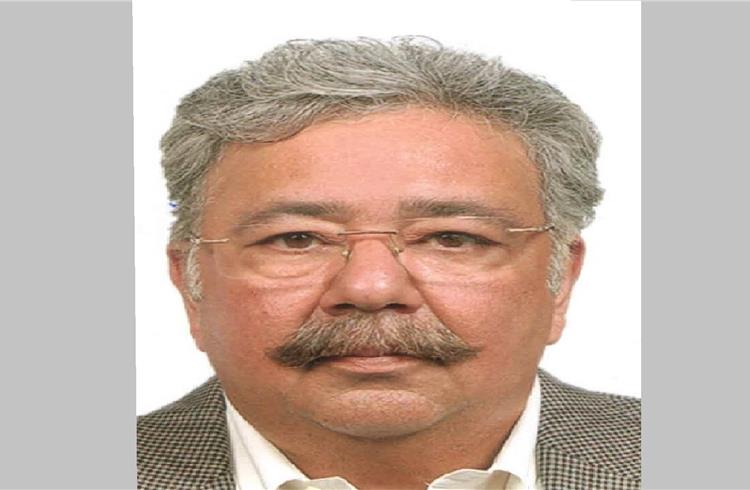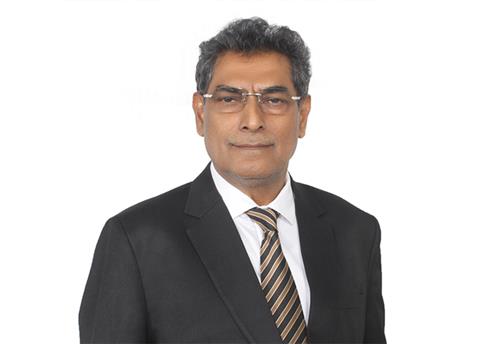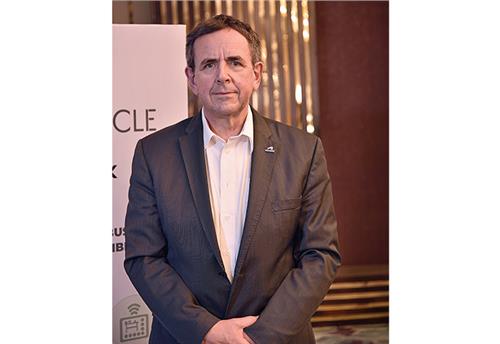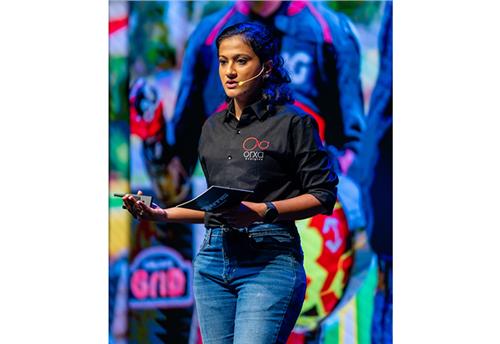'The Indian component industry will see all-round growth in 2016.'
Rattan Kapur, CMD of Mark Exhaust Systems & chairman of CII (Haryana State Council), speaks to Shobha Mathur about the company’s growth game-plan and labour reforms in Haryana.
Rattan Kapur, CMD of Mark Exhaust Systems & chairman of CII (Haryana State Council), speaks to Shobha Mathur about the company’s business expansion, new products, and labour reforms in Haryana.
What is Mark Exhaust System’s future roadmap?
We have been basically an exhaust manufacturing company with our technology partners in Japan. The way forward is for the company to have its own design, testing and validation capability. We are in touch with a company in Japan which is providing us the complete training. Five of our engineers are now based in Hiroshima, South Japan where they are going through the software module training. Maruti Suzuki India has given us a new model for development for 2015-2016 where the designing will be done jointly by our engineers and the Japanese technical provider Hiroteck, which is the master supplier and is also working with Suzuki in Japan.
This training programme will take about two years; we are through with one year and after a year we should be able to stand on our own feet and by 2017 offer complete design and testing solutions to our customers from India itself. That will be a massive cost saving for product development for new models for our customers. We also make door sashes and are making them for most of Maruti’s models. We have expanded into Pune and Nashik where we do door sashes for Mahindra & Mahindra’s XUV500 and are also working on two more new models for them.
We have recently expanded our business and acquired Delphi BWI in India which makes shock absorbers; Maruti Suzuki is again a key customer. We do about 1.5 million shock absorbers for them and we will be expanding that capacity to 3 million by end-2015. We have also acquired a company in the UK which manufactures water and oil pumps and are in discussion with Maruti for a new design of integrated water and oil pump. All the 2015 models in Europe have integrated water and oil pumps. The benefit will be lightweighting of about 120-130 grams and lower cost by 5-6 percent in the part product. So we have a diversified business module as we go forward. Now we are looking at consolidating this business and then expanding it further. As a group, we are at a turnover of Rs 1,200 crore and with these new products we should be hitting the Rs 2,000 crore mark in another 3 years.
Are there more acquisitions on the radar?
No, no more acquisitions are on the radar. However, some of our associate companies are working with Honda Motorcycle & Scooter India. We have set up a plant for HMSI which produces the complete frame and exhaust systems; that’s big business and should generate a turnover of Rs 300 crore this year. Production began last year and we are now expanding our business with Honda and our technical provider Hirotec Inc. If given an opportunity, we will be going in for a new joint venture – Mark Exhaust and Hirotec – in Gujarat to cater to Maruti Suzuki in exhaust systems. Hirotec is providing us the technology, so the idea is that for future models the design and development will take place in India under Herotech’s supervision.
When will the joint venture be signed?
Hirotec’s managing director is visiting India on March 17 to set up a manufacturing company in Gujarat.
There is another MoU as part of the JV under which Mark Exhaust will be provided technology for design, development and testing in India. The JV plant will come up close to Mehsana and Hirotec will have a majority stake in the plant – I expect 55 percent stake to be held by Hirotec and 45 percent by Mark Exhaust.
What much will be the investments that will flow into the new JV plant?
We have not yet decided which products will go there in the first phase, because there is competition and there is another Japanese company that will get part of the business. But a decision has been taken that the JV company should come up there. The plant will go on stream by 2017 as we have to deliver by then.
After the first model, the design and development will happen in India which will result in much lower pricing. This will be hugely beneficial to the customer; for instance, the $ 2-3 million cost for design and testing will fall to $ 1 million.
How badly were you affected by the slowdown? Do you see the green shoots of recovery?
We have been lucky in the sense that the Maruti models for which we were making parts were not affected by the slowdown. While we have not had growth, we have not had negative growth either. We are also working with HMSI and both these companies have shown a positive trend. HMSI has shown a growth of 25-30 percent YoY, which has really helped our bottomline survive. We have not done like we did 5 years ago but we have had a positive balance sheet. Hopefully, the turnaround year will be from 2016 onwards when the industry, Maruti, other carmakers and commercial vehicle makers shall all prosper.
How do you think companies should streamline labour issues, especially as carmakers like Maruti have been at the receiving end?
It is a change of mindset. There was a time when we used to shy away from discussing things with the unions and take it negatively – that attitude has to change. We have to accept the fact that unions are here to stay as the younger generation fully appreciates that workers have aspirations, they are seeing growth around them, they are seeing people riding motorcycles, and think why can’t I have it. When you work, you have to do your best and deliver more. If you are covering high cost by increasing production, then I don’t see why we can’t live happily together.
Secondly we are in touch with the new government in Haryana, with the chief minister and his team through CII. We have a clear guideline from the chief minister to make a new industrial policy for Haryana. Industrial relations and human resources are going to form a key part of this new programme that we are going to put up. We are not in favour of a hire and fire policy but if there is compulsion and a company has not received business orders or has gone down like in the textile industry, we are requesting the Haryana government to create a bank or pool where we will contribute in case we have to layoff people and the government will also contribute for 2-3 months till they get reemployed either in the state or outside the state. The Haryana government has viewed this quite favourably and there is an interesting plan that should be coming up for the state. Going forward, I think it is all positive.
So what kind of labour reforms are you in favour of?
You cannot just shut shop immediately – this is not at all what we want, and the government is supporting us in that. Tamil Nadu has already put the auto industry under the Essential Services Act where it is strictly banned to go on a flash strike. Then, it is OEM suppliers whose production lines have been hit and if there are not big inventories then you cannot shut shop. You have to carry on discussions and negotiations and the government will form part of it.
We are trying to introduce something like that in Haryana. We are also trying to introduce it for companies who have employment of up to 500 people; companies should be allowed to shut shop without going through years of hardship. Maybe 500 will end up at 400 like Rajasthan which has got a policy sanctioned for 300 people. The majority of MSMEs have workers in the range of 500 or below; so giving them this flexibility will be very good for industry. On the other hand, it is not anti-labour because people will become more investor-friendly in the state and the state requires something like a one-million stong workforce. If they don’t do that, then workers will move to Rajasthan, Tamil Nadu and Gujarat. But if the Haryana government is proactive, then everyone will get employment.
What are your stand on land acquisition?
Land acquisition is important and will go through today or tomorrow. If land is not available to industrialists at a low or an average price, how can you put up an industry? When you look at project cost, where you have so much of investment in land and building, it does not make a project viable. Therefore, they have to find a simpler way to compensate the farmer. We have asked the Haryana CM to create 3 kind of zones – a zone which is expensive and allows a higher FSI so that people can build vertically there. Then is a category B that is 20-40km away from the highway but well connected with a good road network so that people don’t mind travelling that distance provided road conditions are good. Category C is a backward category where people want to pick up huge acres of land like 50-100 acres or in non-potable agricultural land where there is brackish water. Let these be converted into industrial zones.
How do you see the auto component industry growing in 2015-16?
It will grow in 2016 – the feel-good factor is there but you are not seeing the effect on the ground. The effect will come but it will take 6-8 months more. So I would put my bet on 2016 when there would be all-round growth.
How is Mark Exhaust strategising its export plans?
Till now we were not making parts that were export oriented but the new range of products that we are looking at – water pumps and shock absorbers – have good potential for exports.
RELATED ARTICLES
BRANDED CONTENT: 'We aspire to be among the leading sensors and electro-mechanical products manufacturer'
P. Parthasarathy, Founder & Managing Director, Rotary Electronics Pvt Ltd shares the company's commitment and vision to ...
‘Big opportunity for startups lies in products in India’: Detlev Reicheneder
As electrification levels the playing field, the focus on tech and R&D to bring innovative products is the mantra for st...
'I hope my journey makes people say — I can do this too'
Ranjita Ravi, Co-founder of Orxa Energies — the maker of Mantis e-bikes — shares the challenges of building a startup an...





 28 Feb 2015
28 Feb 2015
 5317 Views
5317 Views





 Autocar Pro News Desk
Autocar Pro News Desk




